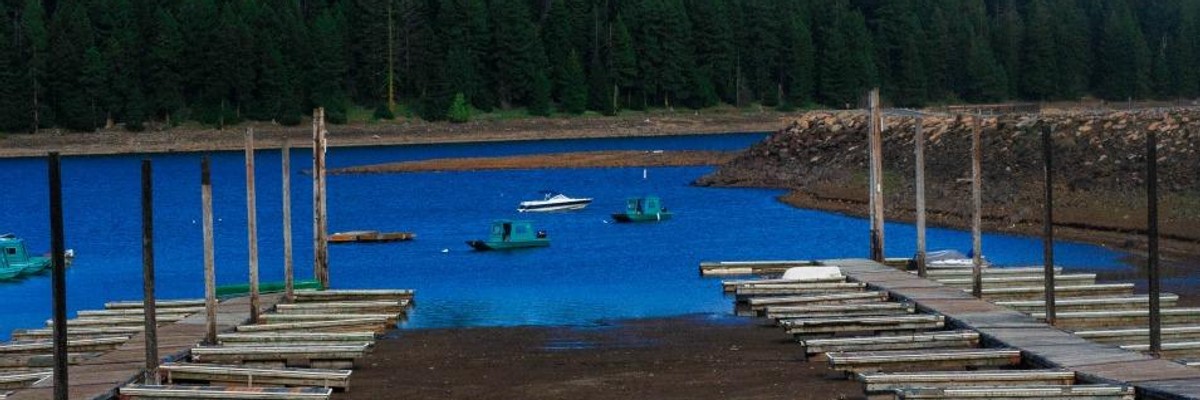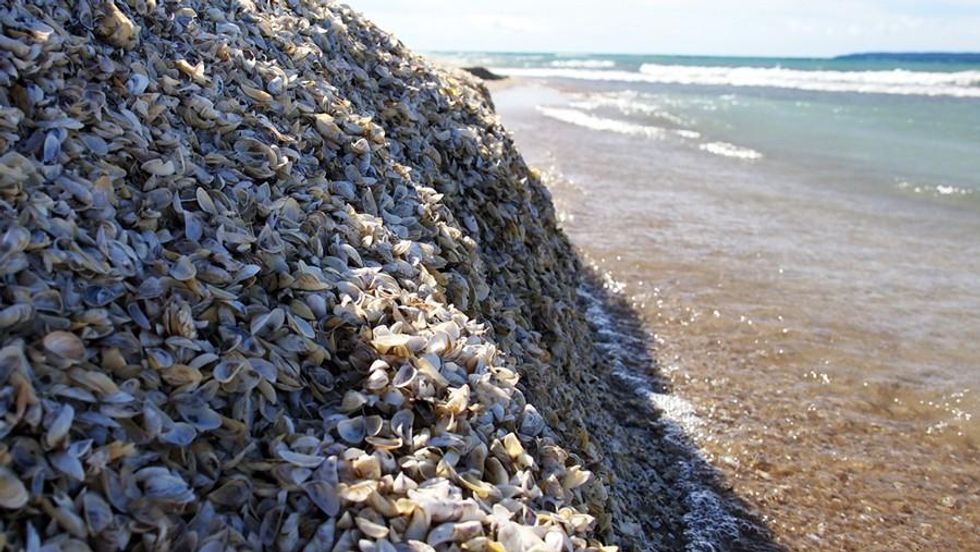

SUBSCRIBE TO OUR FREE NEWSLETTER
Daily news & progressive opinion—funded by the people, not the corporations—delivered straight to your inbox.
5
#000000
#FFFFFF
To donate by check, phone, or other method, see our More Ways to Give page.


Daily news & progressive opinion—funded by the people, not the corporations—delivered straight to your inbox.

The world's lakes are warming at a faster rate than oceans and atmosphere, a trend that may already have triggered major changes in aquatic ecosystems, according to a new report published in Geophysical Research Letters on Wednesday.
Globally, lakes have been heating up an average of 0.34degC (.61degF) per decade between 1985 and 2009, researchers found. In northern climates, the deepest ice-covered lakes are warming at twice the rate of the atmosphere.
"The widespread warming reported here suggests that large changes in Earth's freshwater resources and their processes are not only imminent but already under way," the study concludes.
When lakes warm, their productivity decreases and they become more likely to form toxic algae or become vulnerable to damage by invasive species. That, in turn, threatens delicate ecosystems within the lake, including fish and other wildlife, which can lead to water insecurity, "substantial economic consequences," and, in some cases, "complete ecosystem loss," the study states.
The global average lake surface warming rate during summer seasons implies a 20 percent increase in algal blooms and a five percent increase in toxic algal blooms over the next century, researchers found. That could ramp up dangerous methane gas emissions by 4 percent over the next decade.
"Lakes hold a large majority of Earth's liquid freshwater, support enormous biodiversity, and provide key provisioning and cultural ecosystem services to people around the world. Climate change is among the greatest threats to lakes," the study states. "The pervasive and rapid warming observed here signals the urgent need to incorporate climate impacts into vulnerability assessments and adaptation efforts for lakes."
The researchers focused their study on lakes because their temperatures typically remain stable over time--unlike air, which fluctuates in temperature daily--making them particularly useful in measuring climate change.
"Obviously, Lake Superior is going to stay cold for a very long time," University of Minnesota Duluth Professor Jay Austin, one of the study's co-authors, told the Star Tribune. "But these lakes provide a sort of 'climate antenna' that allows us to look at these global trends."
"Relatively small changes can lead to large changes in systems that define our region," Austin continued. "Duluth would be a fundamentally different place if Lake Superior never formed ice."
The study is the largest of its kind, analyzing temperatures of 235 lakes across six continents that represent more than half of the world's fresh water supply.
"Society depends on surface water for the vast majority of human uses," said co-author Stephanie Hampton, director of Washington State University's Center for Environmental Research, Education and Outreach. "Not just for drinking water, but manufacturing, for energy production, for irrigation of our crops. Protein from freshwater fish is especially important in the developing world."

Donald Trump’s attacks on democracy, justice, and a free press are escalating — putting everything we stand for at risk. We believe a better world is possible, but we can’t get there without your support. Common Dreams stands apart. We answer only to you — our readers, activists, and changemakers — not to billionaires or corporations. Our independence allows us to cover the vital stories that others won’t, spotlighting movements for peace, equality, and human rights. Right now, our work faces unprecedented challenges. Misinformation is spreading, journalists are under attack, and financial pressures are mounting. As a reader-supported, nonprofit newsroom, your support is crucial to keep this journalism alive. Whatever you can give — $10, $25, or $100 — helps us stay strong and responsive when the world needs us most. Together, we’ll continue to build the independent, courageous journalism our movement relies on. Thank you for being part of this community. |
The world's lakes are warming at a faster rate than oceans and atmosphere, a trend that may already have triggered major changes in aquatic ecosystems, according to a new report published in Geophysical Research Letters on Wednesday.
Globally, lakes have been heating up an average of 0.34degC (.61degF) per decade between 1985 and 2009, researchers found. In northern climates, the deepest ice-covered lakes are warming at twice the rate of the atmosphere.
"The widespread warming reported here suggests that large changes in Earth's freshwater resources and their processes are not only imminent but already under way," the study concludes.
When lakes warm, their productivity decreases and they become more likely to form toxic algae or become vulnerable to damage by invasive species. That, in turn, threatens delicate ecosystems within the lake, including fish and other wildlife, which can lead to water insecurity, "substantial economic consequences," and, in some cases, "complete ecosystem loss," the study states.
The global average lake surface warming rate during summer seasons implies a 20 percent increase in algal blooms and a five percent increase in toxic algal blooms over the next century, researchers found. That could ramp up dangerous methane gas emissions by 4 percent over the next decade.
"Lakes hold a large majority of Earth's liquid freshwater, support enormous biodiversity, and provide key provisioning and cultural ecosystem services to people around the world. Climate change is among the greatest threats to lakes," the study states. "The pervasive and rapid warming observed here signals the urgent need to incorporate climate impacts into vulnerability assessments and adaptation efforts for lakes."
The researchers focused their study on lakes because their temperatures typically remain stable over time--unlike air, which fluctuates in temperature daily--making them particularly useful in measuring climate change.
"Obviously, Lake Superior is going to stay cold for a very long time," University of Minnesota Duluth Professor Jay Austin, one of the study's co-authors, told the Star Tribune. "But these lakes provide a sort of 'climate antenna' that allows us to look at these global trends."
"Relatively small changes can lead to large changes in systems that define our region," Austin continued. "Duluth would be a fundamentally different place if Lake Superior never formed ice."
The study is the largest of its kind, analyzing temperatures of 235 lakes across six continents that represent more than half of the world's fresh water supply.
"Society depends on surface water for the vast majority of human uses," said co-author Stephanie Hampton, director of Washington State University's Center for Environmental Research, Education and Outreach. "Not just for drinking water, but manufacturing, for energy production, for irrigation of our crops. Protein from freshwater fish is especially important in the developing world."

The world's lakes are warming at a faster rate than oceans and atmosphere, a trend that may already have triggered major changes in aquatic ecosystems, according to a new report published in Geophysical Research Letters on Wednesday.
Globally, lakes have been heating up an average of 0.34degC (.61degF) per decade between 1985 and 2009, researchers found. In northern climates, the deepest ice-covered lakes are warming at twice the rate of the atmosphere.
"The widespread warming reported here suggests that large changes in Earth's freshwater resources and their processes are not only imminent but already under way," the study concludes.
When lakes warm, their productivity decreases and they become more likely to form toxic algae or become vulnerable to damage by invasive species. That, in turn, threatens delicate ecosystems within the lake, including fish and other wildlife, which can lead to water insecurity, "substantial economic consequences," and, in some cases, "complete ecosystem loss," the study states.
The global average lake surface warming rate during summer seasons implies a 20 percent increase in algal blooms and a five percent increase in toxic algal blooms over the next century, researchers found. That could ramp up dangerous methane gas emissions by 4 percent over the next decade.
"Lakes hold a large majority of Earth's liquid freshwater, support enormous biodiversity, and provide key provisioning and cultural ecosystem services to people around the world. Climate change is among the greatest threats to lakes," the study states. "The pervasive and rapid warming observed here signals the urgent need to incorporate climate impacts into vulnerability assessments and adaptation efforts for lakes."
The researchers focused their study on lakes because their temperatures typically remain stable over time--unlike air, which fluctuates in temperature daily--making them particularly useful in measuring climate change.
"Obviously, Lake Superior is going to stay cold for a very long time," University of Minnesota Duluth Professor Jay Austin, one of the study's co-authors, told the Star Tribune. "But these lakes provide a sort of 'climate antenna' that allows us to look at these global trends."
"Relatively small changes can lead to large changes in systems that define our region," Austin continued. "Duluth would be a fundamentally different place if Lake Superior never formed ice."
The study is the largest of its kind, analyzing temperatures of 235 lakes across six continents that represent more than half of the world's fresh water supply.
"Society depends on surface water for the vast majority of human uses," said co-author Stephanie Hampton, director of Washington State University's Center for Environmental Research, Education and Outreach. "Not just for drinking water, but manufacturing, for energy production, for irrigation of our crops. Protein from freshwater fish is especially important in the developing world."
